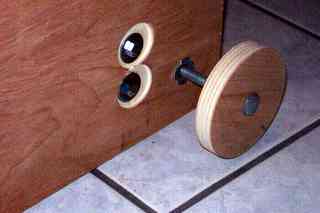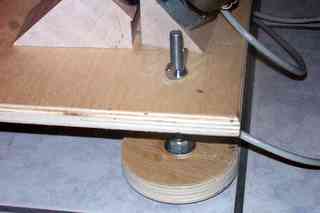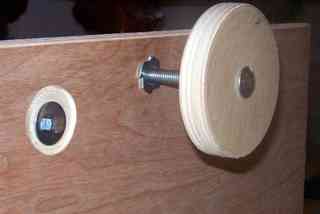Click on the pictures to see larger pictures, and use your browser BACK button to return here!
The northeast foot from the bottom of the platform base. The two bolts and washers are the adjustable mounting for the northeast drive motor.
Platform Foot Considerations
Geometry Factors
You want your platform to have enough feet so it will be supported, but remain stable. One or two legs won't provide support, and four or more can allow the platform to rock if not precisely adjusted. In fact, if the soil under a foot compresses, you will return to the rocking table situation.
This leaves us with the three legged table design, much like a milker's stool. Three points define a plane in geometry, so three seems like the right thing.
Foot Construction
I decided to use 3/8 inch diameter carriage bolts (the round head with the square shank), together with washers and nuts to make the feet.
I used circles cut from scraps to provide some area to my feet -- I just happened to have a hole saw 3-1/2 inches in diameter which I used to cut the feet. Any size larger than about 2 inches in diameter would be quite adequate, and the feet could be square or another shape if desired.
Each foot was pressed onto its carriage bolt, and a washer and nut clamps them together. On the underside of the base, I used a "Tee-Nut" which actually supports the platform. On the upper side of the base, a "Wing-Nut" clamps the foot firmly after it is adjusted.
Other notes in these pictures
You can see several bolts and washers recessed into the bottom of the platform base. Each of these have 1/2 inch diameter holes through which a 1/4 inch lag bolt (think big wood screw) passes, riding on a 1/4 inch fender washer. (Fender washers are much larger in diameter than a normal washer.) This permits a range of adjustment for the bearing mount of about 1/4 inch.


